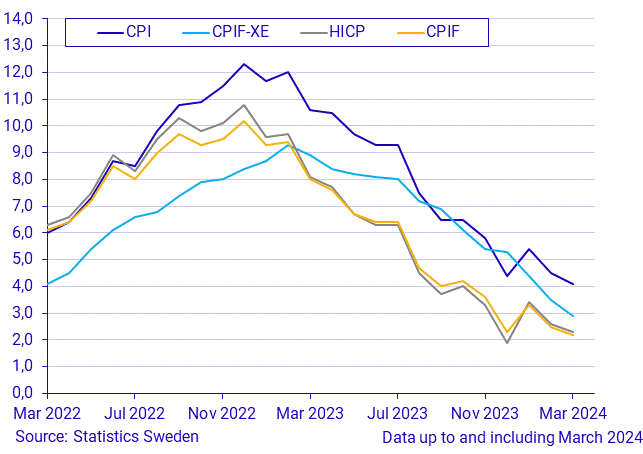Consumer Price Index (CPI), March 2024
The inflation rate according to CPI was 4.1 percent in March 2024
Statistical news from Statistics Sweden 2024-04-12 8.00
The inflation rate according to the CPI was 4.1 percent in March 2024, down from 4.5 percent in February. On a monthly basis, the CPI index increased by 0.1 percent from February to March. The inflation rate according to the CPIF (Consumer Price Index with fixed interest rate) was 2.2 percent March.
– The inflation rate decreased in March. Some certain goods even have a lower price since the same period last year, says Mikael Nordin, statistician at Statistics Sweden.
In brief
| Index Numbers |
Monthly changes, percent |
Annual changes, percent |
|
|---|---|---|---|
| CPI (1980=100) | 414.26 | 0.1 | 4.1 |
| CPIF (1987=100) | 260.53 | 0.1 | 2.2 |
| CPIF-XE (1987=100) | 244.51 | 0.0 | 2.9 |
- The interest rates for household’s mortgages rose and contributed with 2.1 percentage points to the annual inflation rate according to CPI.
- Food prices fell from February to March.
- The annual inflation rate according to CPIF excluding energy decreased from 3.5 percent in February to 2.9 percent in March.
Lower food prices
The CPI increased by 0.1 percent from February to March. In the corresponding period a year ago, prices increased by 0.6 percent.
The monthly change in March was due to increased prices of electricity, clothing and transport services while simultaneously, food prices fell. Furthermore, there were price decreases in recreation and culture, partly due to the yearly book sale.
The table below shows changes on a monthly basis and contributions to the CPI based on the goods and services that had the greatest impact on the CPI in March 2024. The results are presented by COICOP category. COICOP refers to the United Nations classification of household consumption expenditure.
| Category (Coicop) | Monthly changes, percent |
Contribution to CPI Monthly change, percentage points |
|---|---|---|
| Food (01.1) | ‑0.8 | ‑0.1 |
| Clothing (03.1) | 2.6 | 0.1 |
| Electricity (04.5.1) | 1.8 | 0.1 |
| Transport services (07.3) | 2.7 | 0.1 |
| Recreation and culture (09) | ‑1.3 | ‑0.2 |
Contributions to the inflation rate in March
The inflation rate according to the CPI, that is, the change in the CPI from the same month last year, was 4.1 percent in March 2024. This is a decrease from February, when the inflation rate was 4.5 percent.
The contributions to the inflation rate in March mostly came from higher housing costs, which was mainly affected by increased mortgage costs and fees for rented and tenant-owned apartments. The higher housing costs was partly offset by lower electricity prices.
Transport prices rose, mostly due to higher prices of transport services. However, the increase was moderated by lower prices on diesel.
Furthermore, prices rose within recreational and cultural services as well as restaurant visits. In addition, there were price increases on alcoholic beverages and tobacco, health and clothing.
The inflation rate according to CPIF, which unlike CPI is not affected by changes in mortgage interest rates, was 2.2 percent in March. The corresponding rate for February was 2.5 percent.
The inflation rate calculated excluding energy products (CPIF-XE) was 2.9 percent in March, which is a decrease compared to February when it was 3.5 percent.
| Category (Coicop) | Yearly change, percent |
Contribution yearly change CPI percentage points |
|---|---|---|
| Alcoholic beverages and tobacco (02) | 4.9 | 0.2 |
| Clothing (03.1) | 5.2 | 0.2 |
| Electricity (04.5.1) | ‑9.1 | ‑0.3 |
| Actual rentals for housing (04.S) | 5.0 | 0.5 |
| Interest expense, owner occupied-housing (part of 04.x) | 34.9 | 1.4 |
| Interest expense, tenant-owned apartments (part of 04.y) | 39.3 | 0.7 |
| Health (06) | 5.6 | 0.2 |
| Diesel (part of 07.2.2) | ‑17.5 | ‑0.2 |
| Transport services (07.3) | 7.2 | 0.2 |
| Recreation and culture (09) | 3.1 | 0.4 |
| Restaurants (11.1) | 4.3 | 0.2 |
| Miscellaneous goods and services (12) | 4.5 | 0.3 |
Different measures of inflation
Statistics Sweden calculates different inflation measures for different purposes. The CPIF is the Riksbank’s target variable, while CPI is the measure used for purposes of compensation. The CPIF includes the same goods and services as CPI. The difference between the CPI and the CPIF is that the latter measure holds interest rates for household’s mortgages constant. Consequently, the effect of changed interest rates for household’s mortgages is only captured by the CPI and not the CPIF.
Additional to the CPI and the CPIF, the HICP is also calculated. The HICP is a harmonized measure of inflation used within the EU cooperation. Another index that is calculated each month is CPIF-XE (the CPIF excluding energy products) which is often used as a measure of underlying inflation.

Definitions and explanations
The CPIF shows the same price trend as the CPI, but without the direct effects of a changed monetary policy. The CPIF is the Riksbank’s target variable for the inflation target.
The CPIF excluding energy (CPIF-XE) and the CPIF with constant tax (CPIF-CT) are two other measures of inflation produced by Statistics Sweden on behalf of the Riksbank. In the CPIF-XE, energy products are excluded from the CPIF, while in the CPIF-CT the taxes and subsidies associated with the products in the CPIF are kept constant.
The HICP (Harmonised Index of Consumer Prices) is produced by all EU Member States. This measure has a somewhat smaller coverage than the CPI and the CPIF, mainly because parts of households’ housing costs are omitted.
Next publishing will be
2023-05-15 at 8:00.
Statistical Database
More information is available in the Statistical Database
Feel free to use the facts from this statistical news but remember to state Source: Statistics Sweden.
